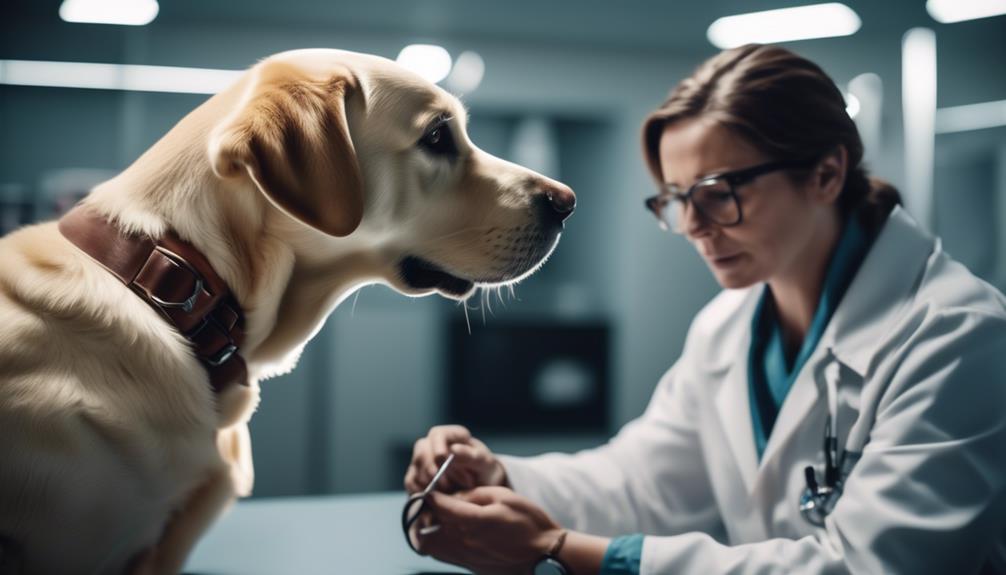When to Consider a Labrador Retriever for Your Family Pet

Labrador Retrievers make excellent family pets due to their friendly and loyal nature. However, it's important to consider their exercise needs and ongoing expenses before bringing one into your home.
Key Takeaways
- Labrador Retrievers are friendly, affectionate, and highly adaptable, making them a great choice for a family pet.
- Labradors require regular exercise to prevent boredom and maintain a healthy weight.
- Labradors are prone to certain health issues such as obesity, eye conditions, and joint problems, so regular vet check-ups and appropriate exercise are important.
- Grooming is necessary to keep Labradors' coats healthy, and ongoing expenses for food, veterinary care, grooming, and potential health conditions should be considered before owning a Labrador.
Labrador Retriever Temperament
Labrador Retrievers exhibit a friendly and affectionate nature, making them ideal family pets. Known for their loyalty and affectionate nature, these dogs are highly adaptable to different environments. Labradors are intelligent and trainable, which makes them good companions for families. They've a natural instinct to please their owners, making them eager to learn and follow commands.
Labradors are known for their patience and gentle demeanor, especially with children. They're often referred to as the 'nanny dogs' due to their ability to watch over and protect young ones. Their friendly nature makes them great playmates, and they're generally tolerant of rough play and handling.
However, Labradors are energetic dogs that require regular exercise to maintain a healthy lifestyle. They love to play fetch, go for long walks, and swim. Their high energy levels make them excellent companions for active families who enjoy outdoor activities.
Exercise Needs of Labradors

To ensure the health and happiness of Labradors, it's essential to provide them with daily physical exercise. Labradors are a breed known for their high energy levels, and without regular exercise, they can become bored and develop destructive behaviors. Ideal activities for Labradors include walking, running, swimming, and engaging in interactive games that provide mental stimulation. These activities not only help meet their exercise needs but also strengthen the bond between Labradors and their families.
Regular exercise is especially important for Labradors living in families with young children. Labradors are known for their gentle and friendly nature, making them excellent companions for young kids. However, their large size and high energy levels can sometimes lead to accidental knocks or bumps. By providing Labradors with regular exercise, their energy levels can be better managed, reducing the risk of accidents and creating a safer environment for both children and dogs.
In addition to physical exercise, Labradors also benefit from obedience training. This breed is highly intelligent and eager to please, making them responsive to training. Obedience training not only provides mental stimulation but also helps strengthen the bond between Labradors and their owners. It allows them to learn commands and proper behavior, making them more well-behaved family pets.
Lastly, it's important to note that Labradors, like any other breed, require regular health checks. This includes routine vaccinations, regular grooming, and visits to the veterinarian. By ensuring their overall health, Labradors can better enjoy their daily exercise and provide long-lasting companionship to their families.
Labrador Retriever Health Considerations

Regular exercise and obedience training are crucial for Labrador Retrievers. Alongside these considerations, it's important to be aware of the health factors that can affect this breed. Labrador Retrievers make great family pets, but it's essential to provide them with the necessary veterinary care and regular grooming to ensure their well-being.
Some important health considerations for Labrador Retrievers include:
- Obesity: Labradors have a tendency to gain weight easily, so it's crucial to provide them with a balanced diet and regular exercise to prevent obesity and associated health issues.
- Eye conditions: Labrador Retrievers are prone to certain eye conditions such as retinal atrophy, which can lead to vision loss. Regular vet check-ups can help identify and address these issues early on.
- Elbow Dysplasia: This is a common condition in Labradors, where the elbow joint doesn't develop properly, leading to lameness and discomfort. Regular vet check-ups and appropriate exercise can help manage this condition.
Labrador Retrievers have a lifespan of around 10-12 years. By providing them with proper veterinary care, regular grooming, and a healthy lifestyle, you can ensure they live a long and happy life as beloved family pets.
Labradors as Family Pets

When considering a Labrador Retriever as a family pet, it's important to understand their intelligent and friendly nature, as well as their need for regular exercise and grooming. Labrador Retrievers are one of the most popular breeds worldwide and make great family pets due to their loving and affectionate nature. They're known for their loyalty and are especially good with children and other pets, making them an ideal breed for families. Labradors thrive in a loving and active family environment where they can receive plenty of exercise and attention.
Labrador Retrievers are intelligent dogs, which makes them easy to train and adapt to family life. They're eager to please their owners and are quick learners. This makes them an ideal choice for families who desire a pet that can be easily trained and integrated into their daily routine.
In addition to their intelligence, Labradors require regular grooming to keep their fur clean and healthy. Their double coat is dense and waterproof, which helps to protect them from the elements. Regular brushing will help to prevent their fur from matting and keep it looking good.
Additionally, Labradors are active dogs and require plenty of exercise to keep them happy and healthy. Daily walks, playtime, and mental stimulation are all essential for their well-being.
Labrador Retriever Training Tips

Labrador Retrievers, with their intelligent and friendly nature, are easily trainable, making Labrador Retriever Training Tips essential for owners looking to establish good behavior habits. Here are some tips to help you train your Labrador Retriever:
- Start training early: Begin training your Labrador as soon as you bring them home. This will help establish good behavior habits from a young age.
- Use positive reinforcement: Labrador Retrievers respond well to positive reinforcement methods, such as rewards and praise. This encourages them to repeat desired behaviors.
- Be consistent and patient: Consistency and patience are key when training a Labrador. Set clear expectations and stick to them, being patient as your dog learns and grows.
- Socialize your Labrador: Socialization is crucial for a well-behaved Labrador. Expose your dog to different people, animals, and environments to help them become confident and well-adjusted.
- Obedience training: Consider enrolling your Labrador in obedience classes. These classes can provide structure and help prevent behavioral issues.
- Regular exercise: Labrador Retrievers are an active breed and require daily exercise. Regular exercise helps keep them physically and mentally stimulated.
- Grooming: Labradors have a short, dense coat that requires regular grooming. Brushing their fur and cleaning their ears and teeth will help keep them healthy and comfortable.
- Choose a puppy wisely: When choosing a Labrador puppy, look for one with a good temperament and health history. This will set the foundation for a well-behaved and healthy companion.
Size and Growth of Labradors

Labradors, known for their medium to large size and sturdy build, exhibit a distinctive otter tail, webbed feet, and a water-resistant coat. These qualities make them excellent swimmers and retrievers, which is why Labrador Retrievers are often considered a good family breed.
When fully grown, Labradors reach a height of 21.5 to 24.5 inches and weigh between 55 to 80 pounds. Their athletic and agile bodies require regular exercise to stay healthy and happy. It's important to note that Labradors have high energy levels and need plenty of physical activity to prevent weight gain and obesity.
Regular exercise, such as daily walks or playtime in a securely fenced yard, is essential to keep them mentally and physically stimulated. Additionally, Labradors require regular grooming to maintain their water-resistant coat and to prevent matting.
As with many larger dog breeds, Labradors are prone to hip dysplasia, a condition where the hip joint doesn't develop properly. Therefore, it's crucial to provide them with appropriate exercise and monitor their weight to prevent excessive strain on their joints.
Financial Considerations for Owning a Labrador Retriever

After considering the size and growth of Labradors, it's important to also consider the financial aspects of owning a Labrador Retriever. When welcoming a Labrador into your family, there are several financial considerations to keep in mind:
- Ongoing expenses: Owning a Labrador involves regular expenses such as food, veterinary care, and training classes. These costs should be factored into your budget to ensure that you can provide for your furry companion's needs.
- Regular grooming: Labradors have a dense double coat that requires regular grooming to maintain its health and appearance. This may involve brushing, bathing, and occasional professional grooming services. These grooming expenses should be considered when calculating the financial commitment of owning a Labrador.
- Health care: Regular health checks and vaccinations are essential for a Labrador's well-being. These routine veterinary visits should be included in your budget to ensure that your Labrador remains in good health.
Owning a Labrador also means being prepared for potential health issues. Labradors are prone to obesity, so a balanced diet and potential weight management costs should be considered. Additionally, Labradors are susceptible to conditions like hip and elbow dysplasia, which may require additional financial resources for treatment and care.
Frequently Asked Questions
Do Labradors Make Good Family Pets?
Labradors are excellent family pets due to their friendly and adaptable nature. They require regular exercise and grooming, but training and socialization can lead to a well-behaved companion. Labradors also get along well with other pets.
Is a Labrador Retriever Right for Me?
A Labrador Retriever may be the right choice for someone seeking an active and friendly family pet. They require regular exercise, grooming, and socialization. Training and positive reinforcement are important for a well-behaved Labrador. Health care, space, and dietary needs should also be considered.
Are Labrador Retrievers Good for First Time Owners?
Labrador retrievers are good for first-time owners due to their intelligence and trainability. Their friendly and affectionate nature makes them great companions for families with children. However, potential owners should be prepared for their exercise needs and ongoing expenses.
What Is the Best Age to Get a Labrador?
The best age to get a Labrador is when they are 8-10 weeks old. This allows them to adapt to their new environment and bond with their owners. Consider your lifestyle and schedule when getting a Labrador, as puppies require more time and attention.









